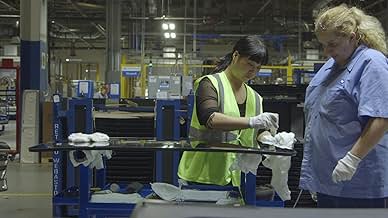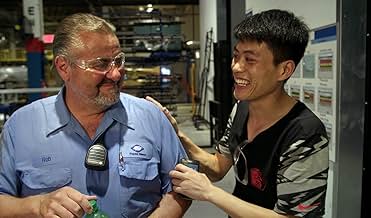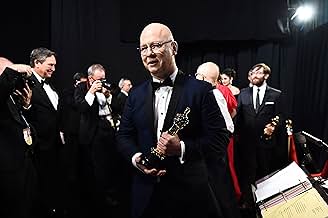In post-industrial Ohio, a Chinese billionaire opens a factory in an abandoned General Motors plant, hiring two thousand Americans. Early days of hope and optimism give way to setbacks as hi... Read allIn post-industrial Ohio, a Chinese billionaire opens a factory in an abandoned General Motors plant, hiring two thousand Americans. Early days of hope and optimism give way to setbacks as high-tech China clashes with working-class America.In post-industrial Ohio, a Chinese billionaire opens a factory in an abandoned General Motors plant, hiring two thousand Americans. Early days of hope and optimism give way to setbacks as high-tech China clashes with working-class America.
- Won 1 Oscar
- 19 wins & 49 nominations total
- Self - Furnace Off-Loader
- (as Bobby)
Featured reviews
Co-directors Steven Bognar and Julie Reichert share an Oscar nomination (she has 3 total) for their 2009 documentary short, THE LAST TRUCK: CLOSING OF A GM PLANT. This time out, they have impressive access to a remarkable situation: a successful Chinese company opening a factory in the United States, and attempting to merge two distinctly different cultures. We hear much these days about globalization, and by the end of the film, you'll likely be re-defining the word.
This unique business model came with good intentions on both sides. The differences that start out as kind of funny and well-intentioned turn into hurdles that are nearly impossible to manage. Fuyao ships many workers from China to Dayton for the training of U.S. workers. These 'temporary' transplants must spend two years away from their family as they try to make sense of an unfamiliar land far different from home. Workshops are held for the Chinese workers as they are lectured on what makes Americans different ... they don't work as hard, they don't dress well, they talk too much on the job, they won't work overtime, etc. The Chinese blatantly state that they are superior to American workers - a point that's difficult to argue against when it comes to dedication, quality, and efficiency. We soon learn there is more to the picture.
U.S. labor and safety laws exist for a reason, and the Chinese company neither understands these, nor is very willing to abide by them. Additionally, since this is the 'rust belt', the shadow of unionization hovers from day one. While China's Workers' Union functions in sync with companies, U.S. labor unions are regularly in conflict with companies here. When the U.S. supervisors make a training and observation trip to China to see the Fuyao factory, the differences become even more obvious. The mostly overweight Americans show up casual - one even in a JAWS t-shirt - while the lean and fit Chinese are all in fine suits and ties. Morning shift routines are also contrasted to point out the gaps in discipline and attention to details.
What the filmmakers do best is allow us to see both sides of the issue. Surely the right thing to do is obvious when it comes to safety, and when Chairman Cao says the real purpose in life is one's work, well, we realize these two cultures are farther apart than the 7000 miles that separate them. It's a fair look at both sides, but for those who say U.S. companies are too focused on profit, they'll likely be surprised to learn that Chinese factory workers typically get 1 or 2 days off from work each month! As one of the dismissed American managers states, you can't spell Fuyao with "fu". The film seems to present a debate with lines drawn via citizenship and culture, and the contrast might be more relevant today than ever before.
At the Q&A at the premiere at IFC Center, co-director Julia Reichert was at pains to stress that the film was never meant to be polemical, that this was an effort to immerse and learn. While some of the silllier aspects of both cultures, (but especially the regimented and self-congratulatory aspects of the Chinese). come through with particular acuity, you can't help buy muse on how Americans have acted with equal tin-earedness and cultural arrogance around the world, over many more decades than the Chinese have been at this game.
At the same time, America's neediness of manufacturing jobs, even if they don't pay a living wage, and the ways that so many of what we would normally consider our core values go out the window to accommodate anyone who will invest in them, come through particularly clearly. This all comes together in a fight over the establishment of a union that would protect workers' rights and uphold our eroding safety and environmental standards that is the vivid core of the movie.
A final note: This film has an extraordinarily compelling musical score by someone names Chad Cannon that propels and highlights the narrative and is amazingly effective on its own terms. Although the idiom is different, Cannon's score does for this film much of what Philip Glass's have done over the years for the films of Errol Morris, and that is high praise indeed.
The Chinese management team that comes in doesn't always care about safety or the environment, but they're brutally efficient and drill their workers like an army or Communist party members, the latter of which is ironic, since the workers are so far from the ideals of communism, e.g. having real power and sharing the wealth of their labor. Meanwhile, one seriously wonders whether Americans can compete in this space, having been "spoiled" by prosperity and earlier times when they made a decent salary. You know, how dare they want a good work/life balance!
Where the documentary falls short is in not showing us the treatment of these workers under the American company beforehand; it really could have used a one hour segment on that. If it had taken the time to do so, we would have seen the same problematic behavior from American corporate executives squeezing every last drop out of their workers for the sake of the bottom line, ultimately leading to outsourcing manufacturing to overseas workers forced to work long hours, often away from their families.
The only effective means of worker power is through unionizing, and both Chinese and American executives resist it mightily, using pages from the exact same playbook, like targeting leaders and paying for propaganda campaigns. In a sense, the American executives going overseas was like finding a pool of scabs to cross the picket line. As one of the state congressmen observes in speaking to the workers, corporate profitability and treating workers respectfully via a living wage are not incompatible things, and it's shameful that they're treated that way out of unfettered greed in extreme capitalism. (Hmm, if only there was an international labor organization, lol)
It seems to me it's a system that spirals upon itself further - when you distribute the wealth so incredibly unfairly in a country, the vast majority of consumers can't afford to pay the premium for a product that was made by unionized hands. They often don't have the economic freedom to do that, or to do things like shop at a mom 'n' pop shop instead of some corporate goliath like Wal-Mart, because they're living paycheck to paycheck and every penny matters. The result is to further drive the system in the direction it's going. Suddenly the middle-class starts dwindling and people are hoping more for a miracle ala the lottery than thinking they can truly make it. The documentary doesn't mention any of this so I'm guilty of rambling on here, but it did make me think.
The ending sequence is sobering as well, showing management practically salivating over robotics taking the place of workers - you know, those pesky things on the payroll that do all of that complaining, sometimes get sick or pregnant, etc. Hey, we can drive costs down by just replacing them with machines! It's too bad no one asks any of the executives the difficult moral questions, like what the right thing to do is, or how they justify their behavior. Overall though, well done, and pretty chilling stuff.
Did you know
- TriviaDirectors Steven Bognar and Julia Reichert previously worked on the short documentary The Last Truck: Closing of a GM Plant (2009). It is about how the plant was shut down by General Motors, a topic in this movie.
- Quotes
Himself - Fuyao Safety Director: Everybody at every level will say that we really, really want to be safe. But safety doesn't pay the bills.
- ConnectionsFeatured in The Oscars (2020)
- How long is American Factory?Powered by Alexa
Details
- Release date
- Country of origin
- Official site
- Languages
- Also known as
- American Factory
- Filming locations
- Production companies
- See more company credits at IMDbPro
- Runtime
- 1h 50m(110 min)
- Color
- Sound mix
- Aspect ratio
- 1.78 : 1
- 1.85 : 1
































